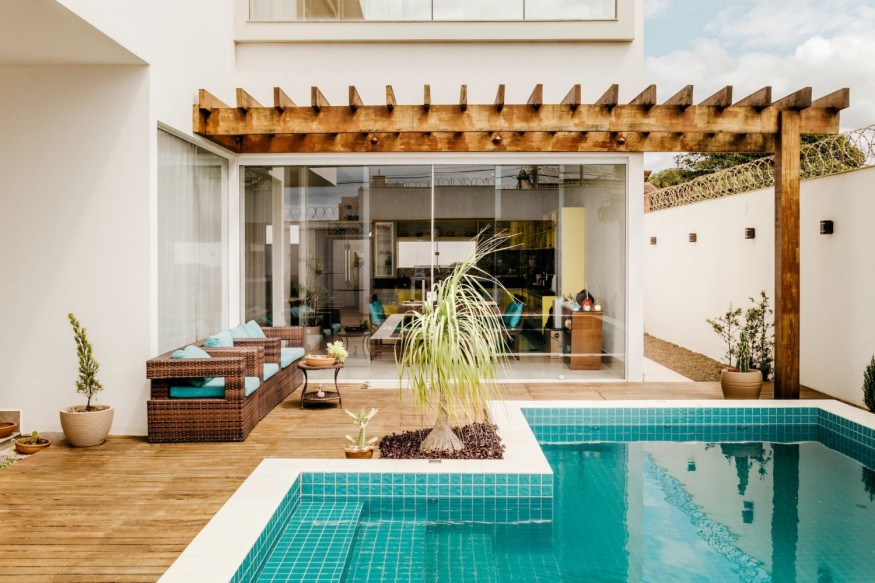
Having swimming pools on your property are a great way to make your house more kid-friendly. When you own a house with a pool, you enjoy easy access to fun water activities for the whole family.
However, there's an obvious concern about whether an outdoor or indoor swimming pool is more advantageous. It's helpful to know the advantages and disadvantages of an indoor pool, in contrast to those of an outdoor pool, if you're considering installing one in your home.
Pros of Installing an Indoor Pool
There are many reasons to be thrilled about an indoor pool, whether you're a serious swimmer or you just like to swim to relax. We'll list a few of the most compelling reasons you should build one in your home.
Low Maintenance
Indoor pools are protected from debris that can be found outdoors. They don't require as much frequent maintenance as outdoor pools, which can quickly become packed with debris like leaves and twigs. Therefore, the swimming pool will require less maintenance than an outdoor one. Overall, less upkeep will make your life easier and save you money.
Also, a lot of chemicals are used in public pools. Compared to outdoor pools, indoor pools require less frequent water sanitation and chlorination. This is because indoor pools don't have to deal with the damaging effects of direct sunlight or ultraviolet rays. Therefore, their maintenance costs are lower.
Private Wellness
If you don't enjoy sharing your space with others, installing an indoor pool in a small area can be a great solution. If you want to swim, you can do so whenever you like. Of course, the price for increased privacy is higher.
But if you're prepared to invest in your health and fitness by installing an indoor swimming pool, you may get a loan to cover the construction cost. The best part is that you can even get a loan for bad credit. So, if your credit score isn't too stellar, rest assured that personal loans for credit score under 550 are available for you.
Also, having an indoor swimming pool is like having your private fitness center. The health benefits of swimming, mainly if done in a heated indoor pool, are unparalleled by any other sport.
For adults and children, swimming pools are a fantastic chance to exercise. Swimming, for instance, is a low-impact activity with many benefits compared to running. And everyone, young and old, can find something to enjoy about a pool.
Value to Property
Adding a swimming pool to your property is a great way to boost its resale value. The indoor option is preferable if you must choose between an indoor and an outdoor pool. It also adds visual appeal to your home, making it feel like a true oasis of comfort and relaxation.
You Can Control the Temperature
In contrast to outdoor pools, which often aren't heated, you can set the temperature of an indoor pool to exactly what you want. Typically, indoor swimming pools have heating systems that allow you to adjust the temperature of the water to your preference.
Year-Round Use
You may swim for exercise at any time of the year in an indoor pool, making it an excellent choice for those who enjoy using their pool for recreation. No matter the weather outside, you can still swim in the pool.
A refreshing dip in the pool is the perfect solution for those scorching summer days. Even if you're shivering and uncomfortable in the dead of winter, a swim in the indoor pool is sure to warm you up.
No Winterizing
Outdoor pools must be drained and closed at the end of summer. Unfortunately, they can be damaged by elements or prolonged contact with chemicals. With an indoor pool, you can save the hassle of winterizing your pool and spend more time relaxing in the water.
Cons of an Indoor Pool
While there are several benefits to having an indoor pool, there are also some drawbacks to consider before investing.
Humidity
Air humidity is affected by water vapor from a swimming pool, and this is less of a concern in outdoor pools. Installing a pool dehumidifier and other unique building features, such as vapor barriers, is essential for indoor pools. This includes sealing around lights, outlets, doors, etc. Additionally, walls become damp and moldy when exposed to excess moisture.
A lack of an adequate vapor barrier will result in moisture seeping out of the natatorium, which can cause damage to the building's insulation, wood structure, drywall, electrical fixtures, and other components.
Expensive
Indoor pools are more expensive to build than outdoor pools of the same size. Consider the available area while deciding the pool's size, shape, and depth.
No matter how you do the math, indoor pools will always be more expensive than outdoor ones. Budget at least $200,000 if you want to construct a brand-new indoor pool. Aside from the higher initial investment, maintaining an indoor pool will significantly raise your monthly energy costs.
Final Thoughts
Indoor pools have been rising in popularity recently, and for a good reason. With many advantages over outdoor pools, indoor pools have recently been a popular addition to residences. However, times have changed, and today's homeowners must consider both the advantages and disadvantages of installing an indoor pool.
© 2025 ScienceTimes.com All rights reserved. Do not reproduce without permission. The window to the world of Science Times.











